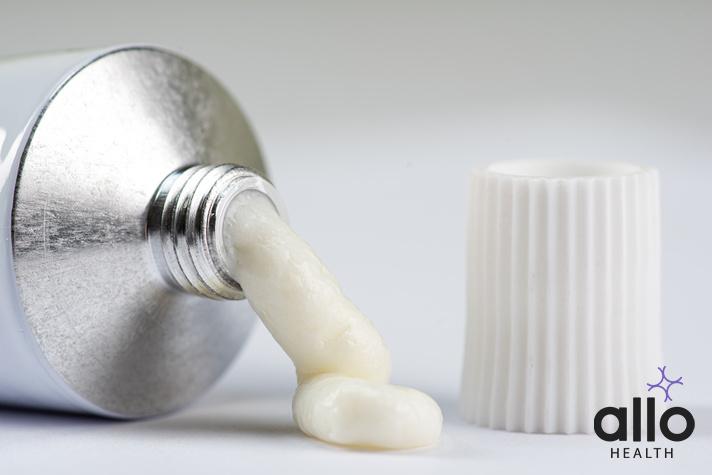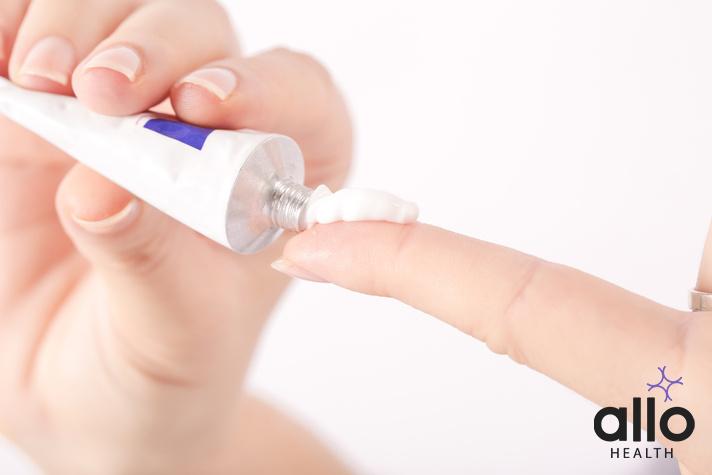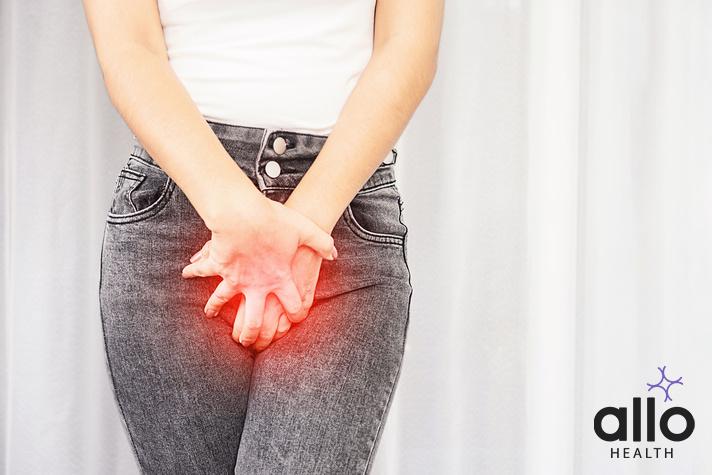7 Best Lidocaine Cream for Vulvodynia

Allo Health is dedicated to personalized well-being, offering support and trusted information tailored to individual health goals. The platform emphasizes human-generated content, led by a distinguished medical team of experts, including physicians and sexual health specialists. Their commitment to credibility involves rigorous fact-checking, authoritative research, and continuous updates to ensure accurate, up-to-date information. Allo Health's unique approach goes beyond conventional platforms, providing expert-led insights and a continuous commitment to excellence, with user feedback playing a crucial role in shaping the platform's authoritative voice.

Dr Sanina Mansoor holds MBBS degree from Yenepoya university,Mangalore.She has 8 years of experience working as a medical officer at various health centres and medical colleges.
Why This Was Upated?
Our experts continually monitor the health and wellness space, and we update our articles when new information became available.
Updated on 21 May, 2024
- Article was updated as part of our commitment to diversity, equity, and inclusion.

"The following blog article may discuss medical treatments and interventions. However, it is important to note that the information provided is for general educational purposes only and should not be considered as a substitute for professional medical advice, diagnosis, or treatment. Always seek the guidance of a qualified healthcare professional for personalized medical advice.
Book consultation
Medical treatments are complex and should be tailored to individual circumstances. The information presented in this blog may not be applicable to everyone, as each person's medical condition, history, and needs are unique. Only a qualified healthcare professional can evaluate your specific medical situation, consider relevant factors, and provide appropriate recommendations for diagnosis, treatment options, and monitoring.
It is crucial to note that self-diagnosis, self-medication, or relying solely on the information provided in this blog for treatment decisions can have serious health consequences. "
Vulvodynia is a condition causing pain in the vulva. It’s a chronic pain disorder that can really affect your quality of life. Here, we will explore the best lidocaine cream for vulvodynia, considering recommendations from health care professionals.
What is Vulvodynia?
Vulvodynia is a chronic pain condition characterized by persistent vulvar pain without an identifiable cause. This condition falls under the category of chronic pain disorders and primarily affects the vulvar area – the external part of the female genitalia. Vulvodynia pain can be quite distressing, impacting the quality of life for those affected.
Key aspects of Vulvodynia include:
- Chronic Vulvar Pain: The pain is localized in the vulvar region and can vary in intensity and duration.
- Types of Vulvodynia: There are various forms, such as Vulvar Vestibulitis Syndrome and Generalized Vulvodynia, each with its own characteristics.
- Pain During Intercourse: A common symptom where women experience discomfort or pain during sexual activity.
- Neuropathic Pain: The pain often has a burning, stinging, or itching quality, suggesting a nerve-related origin.
- Pelvic Pain: In some cases, vulvodynia can be part of broader pelvic pain concerns, involving pelvic muscles and pelvic floor muscles.
- Chronic Pain Condition: Vulvodynia is a long-term condition and is considered a part of chronic pain conditions.
- Management of Vulvodynia: Treatment often includes a combination of treatments. This may involve topical medication like lidocaine creams or topical anesthetics, oral medications, physical therapy, and alternative therapies.
- Treatments for Vulvodynia: Besides medical care, treatment can include the use of topical antifungals, testosterone cream, and other chronic pain medications.
- People With Vulvodynia: This condition primarily affects women and can start at any age.
The exact cause of vulvodynia is not well understood, and it can often be a challenge to treat. Health care professionals play a crucial role in diagnosing and managing vulvodynia, aiming to provide sustained pain relief and improve the overall quality of life for those affected.
What is Lidocaine Cream?
Lidocaine cream is often recommended by health care professionals as a topical medication for the treatment of vulvodynia, a chronic vulvar pain condition. This condition, which includes chronic pain disorders like vulvar vestibulitis syndrome, can significantly impact the quality of life, causing symptoms like pain during intercourse, persistent vulvar pain, and neuropathic pain.
Reasons for Using Lidocaine Cream in Vulvodynia Treatment:
- Targeted Pain Relief: Lidocaine cream provides direct relief from vulvar-related pain, specifically targeting the affected area.
- Minimizing Systemic Effects: Unlike oral medications, which can affect the entire body, lidocaine cream works locally, reducing the risk of systemic side effects.
- Managing Neuropathic Pain: Vulvodynia is often characterized by neuropathic pain. Lidocaine, as a topical anesthetic, is effective in numbing the nerve endings, providing sustained pain relief.
- Use in Combination Treatments: Lidocaine cream can be part of a multi-faceted approach to managing vulvodynia. This approach often includes physical therapy to strengthen pelvic muscles, the use of other medications like topical antifungals or testosterone cream, and alternative therapies.
- Reduced Adverse Effects: Compared to other chronic pain medications, lidocaine cream has fewer common side effects, making it a safer option for long-term use.
- Ease of Application: It can be applied directly to the affected area, offering a convenient treatment method for people with vulvodynia.
- Non-Invasive Treatment Option: For those seeking non-invasive solutions for vulvodynia pain management, lidocaine cream presents an accessible option.
Lidocaine cream is valued for its direct, localized pain relief with minimal adverse effects, making it a key component in the comprehensive management of vulvodynia. This topical medication, in conjunction with other treatments, aims to improve the overall quality of life for individuals experiencing chronic vulvar pain. However, it’s crucial to consult health care professionals before starting any new treatment for vulvodynia.
Best Lidocaine Cream for Vulvodynia
Lidocaine cream, used in the treatment of vulvodynia, comes in various types and formulations. Here are some of the different options available:
- Over the Counter (OTC) Lidocaine Creams:
- Lower concentration (usually 2% to 4%).
- Accessible without a prescription.
- Suitable for mild to moderate symptoms.
- Prescription-Strength Lidocaine Creams:
- Higher concentration (typically 5% or more).
- Specifically formulated for more severe symptoms.
- Requires a prescription from a healthcare professional.
- Lidocaine-Prilocaine Cream:
- A combination cream containing both lidocaine and prilocaine.
- Offers a stronger anesthetic effect.
- Primarily used for more intense neuropathic pain.
- Compounded Lidocaine Cream:
- Custom-made by pharmacies according to specific prescriptions.
- Can contain varying concentrations of lidocaine.
- May include other ingredients like gabapentin or amitriptyline for enhanced pain relief.
- Lidocaine Ointment:
- A thicker, more greasy formulation compared to creams.
- Better for sensitive skin or those who prefer a longer-lasting application.
- Suitable for people with chronic vulvar pain.
- Water-Based Lidocaine Creams:
- Less irritating to sensitive skin.
- Better for those who may have reactions to oil-based creams.
- Lidocaine Gel:
- A water-based option that is less messy than ointment.
- Can be easier to apply in sensitive areas.
- Often preferred for its cooling sensation upon application.
Each type of lidocaine cream has its own advantages and suitability depending on the severity and specifics of the vulvodynia symptoms. It’s important to consult with a healthcare provider to determine the most appropriate option.
Choosing the Right Lidocaine Cream

Choosing the right lidocaine cream for treating vulvodynia involves several considerations:
- Consult a Health Care Professional: Before selecting a lidocaine cream, consult a doctor or a specialist in chronic pain disorders. They can provide a diagnosis and recommend appropriate treatments for vulvodynia.
- Consider the Lidocaine Concentration: Lidocaine creams come in different strengths. A health care professional can suggest the right concentration based on the severity and type of your vulvodynia pain.
- Check for Other Active Ingredients: Some creams may contain additional anesthetics or ingredients. Ensure these are suitable for your condition and do not cause allergic reactions.
- Review the Formulation: Look for creams specifically formulated for vulvar application. These are designed to be gentle on sensitive skin.
- Assess the Potential for Side Effects: While lidocaine creams are generally safe, they can cause side effects like itching or irritation. Choose a cream with minimal adverse effects.
- Understand the Duration of Effect: Different creams offer varying lengths of pain relief. Consider how long the cream’s effects last and how it fits into your daily routine.
- Read User Reviews and Testimonials: Checking the experiences of others with vulvodynia can provide insight into the effectiveness of different creams.
- Consider the Cost and Availability: Ensure the cream is within your budget and readily available, either over-the-counter or via prescription.
Risks and Considerations

- Allergic Reactions: Some individuals may have allergies to lidocaine or other ingredients in the cream, leading to skin irritation or more severe allergic responses.
- Skin Sensitivity: Prolonged use can cause sensitivity or irritation to the vulvar area. This includes redness, itching, or burning sensations.
- Systemic Absorption: Although rare, there’s a small risk that lidocaine can be absorbed into the bloodstream, potentially causing systemic effects.
- Limited Efficacy: Lidocaine cream may not be effective for all types of vulvodynia or for all individuals, and its pain-relieving effects are generally temporary.
- Dependence on Cream: There’s a risk of becoming reliant on the cream for pain relief, which doesn’t address the underlying cause of vulvodynia.
- Impact on Sexual Activities: The cream can numb the area, which might reduce sexual pleasure or sensation.
- Overuse: Using the cream more frequently than recommended can increase the risk of side effects.
- Pregnancy and Nursing Considerations: Women who are pregnant or breastfeeding should consult their healthcare provider before using lidocaine cream.
- Incomplete Treatment: Relying solely on lidocaine cream might lead to neglecting other effective treatments for vulvodynia, such as physical therapy or counseling.
- Masking Symptoms: While providing relief, lidocaine cream may mask symptoms, delaying the investigation and treatment of underlying conditions.
It’s important to use lidocaine cream under the guidance of a healthcare professional, especially when treating conditions like vulvodynia.
Conclusion
Lidocaine cream can be a useful tool in the management of vulvodynia. It’s important to approach treatment with a comprehensive plan, often involving physical therapy, alternative therapies, and other complementary treatments. Always consult health care professionals before starting any new treatment for vulvodynia.
Most Asked Questions
-
What exactly does lidocaine cream do for vulvodynia?
Lidocaine cream is a topical anesthetic, meaning it numbs the area where it’s applied. For vulvodynia, this cream can help lessen the pain you feel in the vulvar area. It’s not a cure, but it can make the pain more manageable, especially during activities like intercourse.
-
How long does it usually take for lidocaine cream to work for vulvodynia?
The time it takes for lidocaine cream to start working can vary from person to person. Generally, you might begin to feel relief shortly after applying the cream. However, for ongoing pain management, it might take several weeks or even months of regular use to notice a significant difference.
-
Are there any side effects of using lidocaine cream for vulvodynia?
Like any medication, lidocaine cream can have side effects, but they’re usually mild. Some people might experience irritation or a slight burning sensation at the application site. It’s important to talk to your doctor about any concerns, especially if you have a history of allergic reactions to anesthetic creams.
-
Can I use other treatments along with lidocaine cream for my vulvodynia?
Yes. In fact, many health care professionals recommend a combination of treatments for vulvodynia. This might include physical therapy to strengthen your pelvic muscles, other types of topical medications, or even alternative therapies. Always consult with your doctor to create a treatment plan that’s tailored to your needs.






































